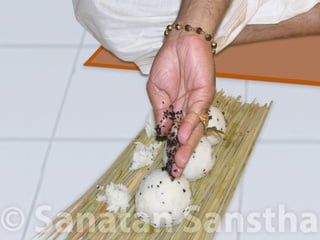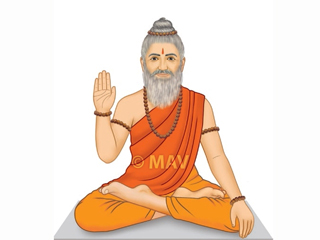#Datta Datta #ShriDatta ShriDatta #mahalaya mahalaya #pitrupaksha pitrupaksha #shraddha shraddha #ShraddhaRituals Shraddha rituals #Shraddhavidhi Shraddha vidhi
Contents
1. Importance of performing Shraddha by oneself
2. Hindu Dharma does not give any cause or excuse for not performing shraddha due to the absence of a particular person !
3. Performance of Shraddhaby women
1. Importance of performing Shraddha by oneself
‘Ideally, the host should perform the ritual of Shraddha by himself. However, since we do not know how to perform it, we get it done through the priest (Brahmin). Nowadays, it has become difficult to get priests for performing Shraddha. As a solution to this, one can procure the holy texts that describe the ritual and learn it by heart. This text is in Sanskrit. Akin to learning other languages, one should also try and learn Sanskrit, which is considered to be God’s language. Also, it is easy to learn Sanskrit.
(Although the point mentioned above is correct, considering the complexity in pronouncing certain Sanskrit words and limitation to understand the rites mentioned in the science, it may not be possible for everyone to perform the ritual as prescribed, by themselves. In such cases one can get the ritual performed through priests and if they are not available, then the ritual can be performed with the help of knowledgeable people in society. One should remember that making the ritual of shraddha is more important – Compiler).
2. Hindu Dharma that does not give any cause for excuse for not performing shraddha due to the absence of a particular person !
Son (including the one whose threading ceremony has not been done), daughter, grandson, great grandson, wife, daughter’s son (if he is one of the heirs), real brother, nephew, cousin’s son, father, mother, daughter-in-law, son of elder and younger sisters, maternal uncle, anyone in the seven generations and from the same lineage (sapinda), anyone after the seven generations and belonging to the same family domain (samanodak), disciple, priests (upadhyay), friend, son-in-law of the deceased person can perform Shraddha in that order.
In case of a joint family, the eldest and earning male person should perform Shraddha. In case of the unit family, everyone should perform shraddha independently.
Hindu Dharma has made arrangement so that for each and every dead person the shraddha can be performed so as to give momentum to that person to progress to a higher sub-plane. Holy text Dharma Sindhu mentions that, ‘If a particular dead person does not have any relative or a close person, then it is the duty of the king to perform Shraddha for that person’.
3. Performance of Shraddha by women
1. In point2 it is mentioned that the daughter, wife, mother and daughter-in-law of the deceased person have the authority to perform Shraddha. In spite of this, in the current era, the priests who conduct Shraddha deny their consent for women to perform Shraddha. This could be because in the earlier days the thread ceremony was performed for females, and in current era, this practice has been discontinued in all classes. Therefore, in accordance to that, even performing of Shraddha has been disallowed for females. In emergency conditions, however, if no one is available for performing Shraddha, then it is better for it to be performed by women instead of not performing it at all.
2. The woman performing shraddha should place a clean cotton cloth on her shoulder while performing ‘Savya-Apasavya’
Reference : Sanatan’s Holy text ‘Shraddha’


 One Lamp for Hindu Rashtra: a unique initiative by Hindu Janajagruti Samiti on Tripurari Purnima
One Lamp for Hindu Rashtra: a unique initiative by Hindu Janajagruti Samiti on Tripurari Purnima British Prime Minister’s Office apologises to Hindus
British Prime Minister’s Office apologises to Hindus Diwali celebrations held at Capitol Hill following the recent presidential election in the United States
Diwali celebrations held at Capitol Hill following the recent presidential election in the United States Punjab CM Maryam Nawaz celebrated Diwali in Pakistan
Punjab CM Maryam Nawaz celebrated Diwali in Pakistan Diwali celebration in the Parliament of Canada is not banned : Clarification by the Opposition
Diwali celebration in the Parliament of Canada is not banned : Clarification by the Opposition Unique research on the effect on Apta leaf (Mountain ebony) on the day of Dussehra !
Unique research on the effect on Apta leaf (Mountain ebony) on the day of Dussehra !